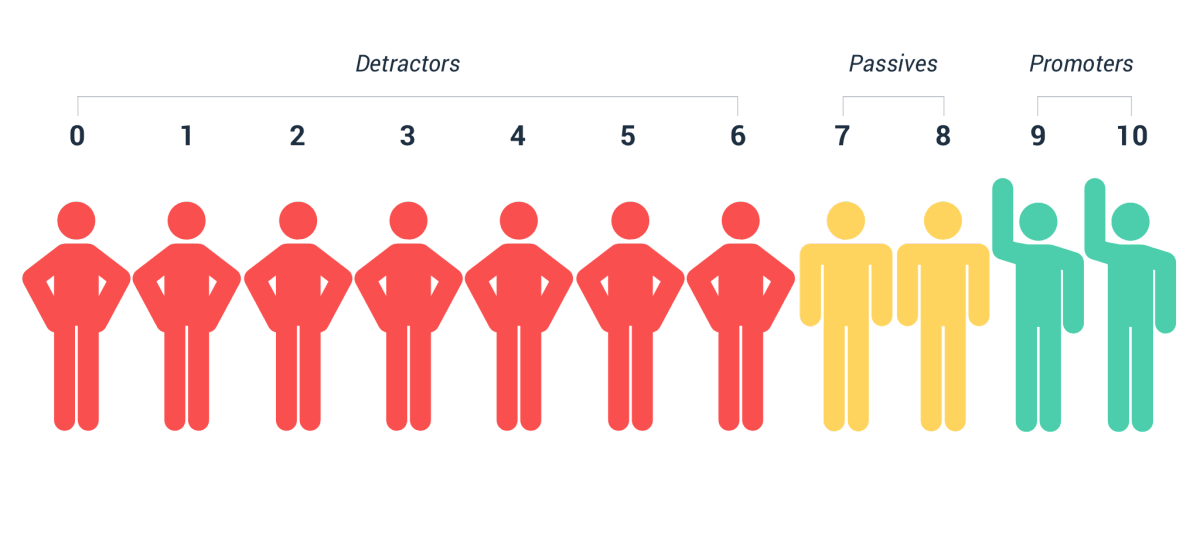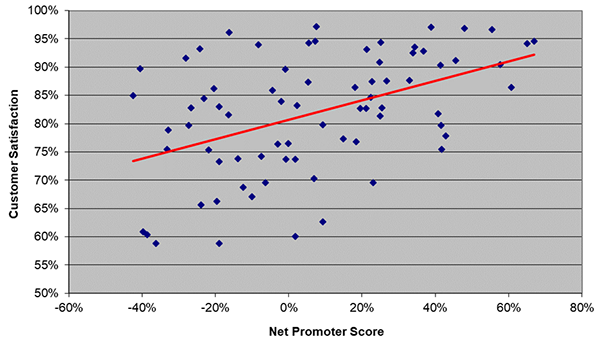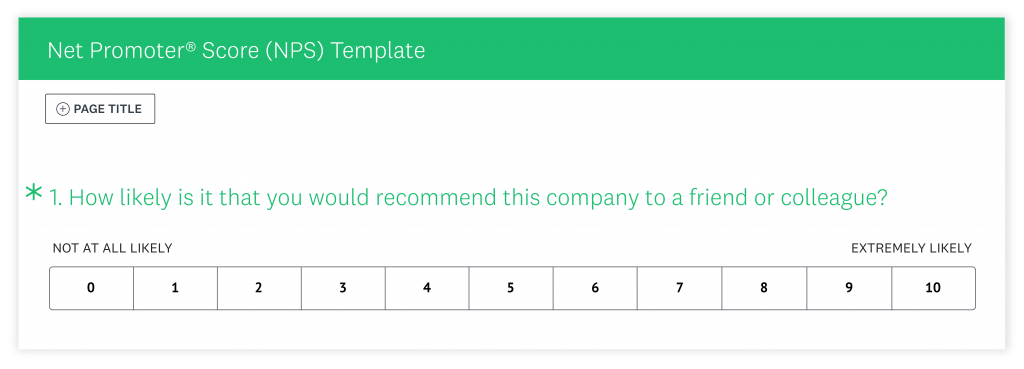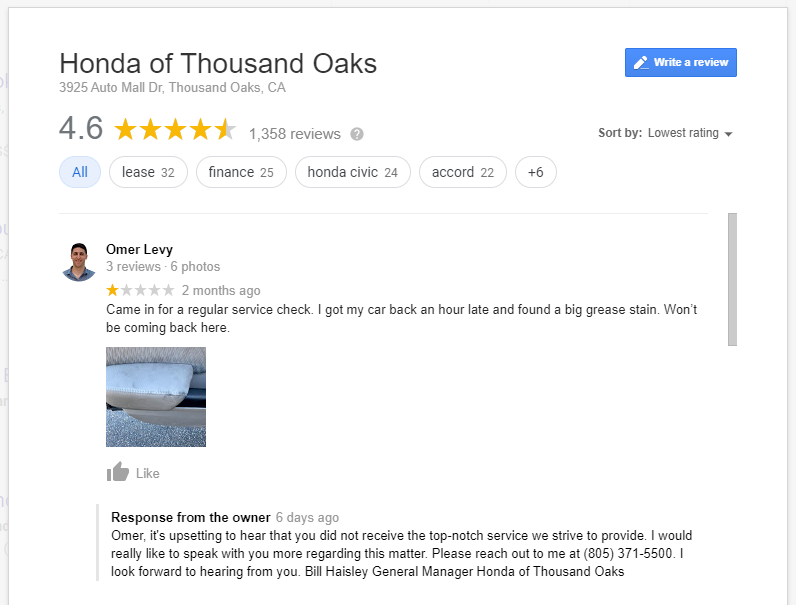Net Promoter Score as a Measure of Corporate Reputation
Imagine for a minute that there was an easy-to-understand metric that told you:
- Where your company stands in your customer’s eyes
- How your company’s reputation measures against your competition
- Exactly who you need to concentrate on to win over
If you had that metric at hand, you would pay close attention to it, right? That powerful measurement does exist, and it’s called a Net Promoter Score, or NPS for short. Your NPS is a robust indicator of your company’s reputation, and its rise and fall can have a powerful effect on that reputation.
Why NPS Matters:
- Customer-centric focus: NPS places your customers at the center of the conversation, helping you gauge their satisfaction and loyalty.
- Competitive insight: It provides a comparative benchmark against competitors, enabling you to identify areas where your reputation shines or needs improvement.
Targeted strategies: NPS pinpoints the individuals or groups you should prioritize to win over, cultivating a community of brand advocates who can keep your reputation in good standing.
This blog will cover Net Promoter Score and its implications on your company’s reputation. Join us in exploring how NPS can be your compass in navigating the ever-evolving landscape of brand perception.
Sections
- What is Net Promoter Score?
- Net Promoter Score methodology
- Why is Net Promoter Score important?
- Is your NPS a trustworthy performance measure?
- How can I improve my Net Promoter Score?
- What is considered a good Net Promoter Score?
What is Net Promoter Score?
While many scoring systems of the past would be based on multiple questions or long surveys, your Net Promoter Score is based on one simple question only:
“On a scale of 1-10, how likely are you to recommend this company to a friend or colleague?”
If you think about it, that is your business’ reputation encapsulated in a single sentence.
Net Promoter Score methodology
To calculate NPS, take the percentage of your customers who would highly recommend your business, company, or service and subtract the percentage of those who would rank it negatively.
On the ten-point scale, the detractors (those that would rank your company a six or lower) are subtracted from the promoters (anyone ranking you a nine or ten). Leave out the passives, which are those in the middle with sevens and eights.

(source: https://medium.com/trustfuel/understanding-net-promoter-score-6f6ca862064f)
Why is Net Promoter Score important?
Personal recommendations are incredibly important to consumers.
According to research done for RewardStream (a viral marketer), personal recommendations “are the #1 driver of consumer purchase decisions at every stage of the purchase cycle, across multiple product categories.”
An NPS score indicating how many of your customers would recommend you to others is a clear indicator of your reputation.
Is your NPS a trustworthy performance measure?
How useful your Net Promoter Score is to your business depends on what you hope to get out of it. Let’s start with the positives:
NPS Pros and Cons
Pros
One thing in favor of NPS is its simplicity.
NPS is easy for you to evaluate (nine is greater than six), and it’s also dead simple for your customers to contribute to. You don’t have to depend on them to take the time to fill out a lengthy survey that subsequently takes even more time to collate and interpret. (Plus, how positive do you think customers feel on page 10 of a 15-page survey?)
NPS helps companies target customers in very specific ways.
For example, because promoters typically want a very different sort of attention than detractors do (e.g., promoters like loyalty programs or specials while detractors usually want to air their grievances and be heard), you may want to target the passives with your full-press sales pitch to convert them.
By identifying who in your market needs what, you will interact with them more effectively and efficiently.
Cons
Naturally, your NPS is not all-powerful for gauging reputation. Some criticisms:
NPS is not always a clear KPI (Key Performance Indicator) for customer satisfaction.
An article at thinkhdi.com examined that, while NPS does correlate with customer satisfaction, it doesn’t correlate as closely as its adherents would have you believe. This information is mixed in with strong customer loyalty, which is not always the same thing.
The chart below graphs customer satisfaction against the NPS for 74 different IT support organizations.

(source: https://www.thinkhdi.com/library/supportworld/2018/metric-of-month-net-promoter-score)
NPS can be a good measure of intention, but not necessarily of action.
A 2007 study found that only half of the people who intended to recommend a company actually followed through. So, while it may
measure how many fans you have, it might not be a good indicator as to how many of those fans will be effective in enhancing your reputation.
How can I improve my Net Promoter Score?
Your promoters are worth their weight in gold as influencers. They are essentially free advertising. But does that mean you can assume they will remain loyal, repeat customers, and essentially forget about them?
No.
Just as you would not ignore your preferred demographic, you can’t ignore promoters. However, you will reward them in different ways than you would your detractors. And you want to make sharing their positive feelings about you as effortless as possible for them.

(Source: SurveyMonkey.com)
Detractors are equally valuable but in a different way.
By self-identifying, they have given you the tremendously valuable opportunity to know exactly who you must reach out to and ask where you’ve gone wrong.
By listening to them and addressing any issues they raise, you can:
- Convert them to promoters
- Prevent future detractors from having the same problem
- Improve your company and business offering as a whole

Finally, by giving the big sell to your passives, you have the chance to convert passives to promoters.
This is a triple win because it simultaneously improves your NPS, loyalty, and bottom line. You also might discover that certain passives are not your prime demographic at all, freeing up resources for other, more attentive audiences and markets.
What is considered a good Net Promoter Score?
Note that no company has achieved a perfect NPS of 100. While there is nothing wrong with trying to hit out of the park, it is best to measure your NPS against your previous rankings and the scores of your current competitors.
If you do need a magic number to measure against, note that 50 is considered an excellent NPS (although it does depend on your industry to some extent).
Final thoughts
Your Net Promoter Score is not just a number; it’s a reflection of your company’s reputation in the eyes of those who matter most – your customers. Its fluctuations, whether upward or downward, hold the potential to impact your brand perception significantly, and, ultimately, your success.
So, as you navigate the ever-evolving landscape of brand perception, remember that your NPS is a valuable tool. By continuously monitoring and improving it, you can ensure that your reputation remains robust and resilient in the face of challenges.
Net Promoter Score FAQs
What will a good Net Promoter Score do for my company’s reputation?
A high Net Promoter Score (NPS) means a large percentage of your customers feel so positively about your business that they are willing to share their positive sentiment and recommend your business to other people. That’s practically the dictionary definition of a good company reputation.
How reliable is Net Promoter Score?
Like many things, the answer is ‘it depends’. As a metric of how your customers are feeling about your brand, NPS is a clear, straightforward, useful value that can be measured and improved. It cuts through the chaff of fuzzy stats to lay bare one of the most vital business metrics: whether someone will recommend your business to other people. However, it can be hard to tease apart intertwined measurements such as customer satisfaction and loyalty. It does not necessarily indicate that your customers will boost your brand’s reputation, even if they are big fans.
What can I do if my Net Promoter Score is bad?
Outreach to increase the number of promoters and turn detractors into forces of good is critical. One good first step is to create a reputation management plan for responding to your detractors and converting passives to promoters.
At the very least, close the feedback loop and get to the bottom of their complaints. Your company’s reputation can quickly slip away from you if you don’t address the negatives. Your NPS also allows you to track the progress of the actionable items in your plans.
NPS is one method of measuring corporate reputation, but there are other methods as well.
About the author
Kent Campbell is the chief strategist for Reputation X, an award-winning online reputation management agency based in California. Kent has over 15 years of experience with online reputation management, Wikipedia editing, review management, and strategy. Kent has helped celebrities, leaders, executives, and marketing professionals improve the way they are seen online. Kent writes about reputation, SEO, Wikipedia, and PR-related topics, and is an expert witness for reputation-related legal matters.
–
Tags: Corporate Reputation, Reputation Management, Reputation Marketing.
